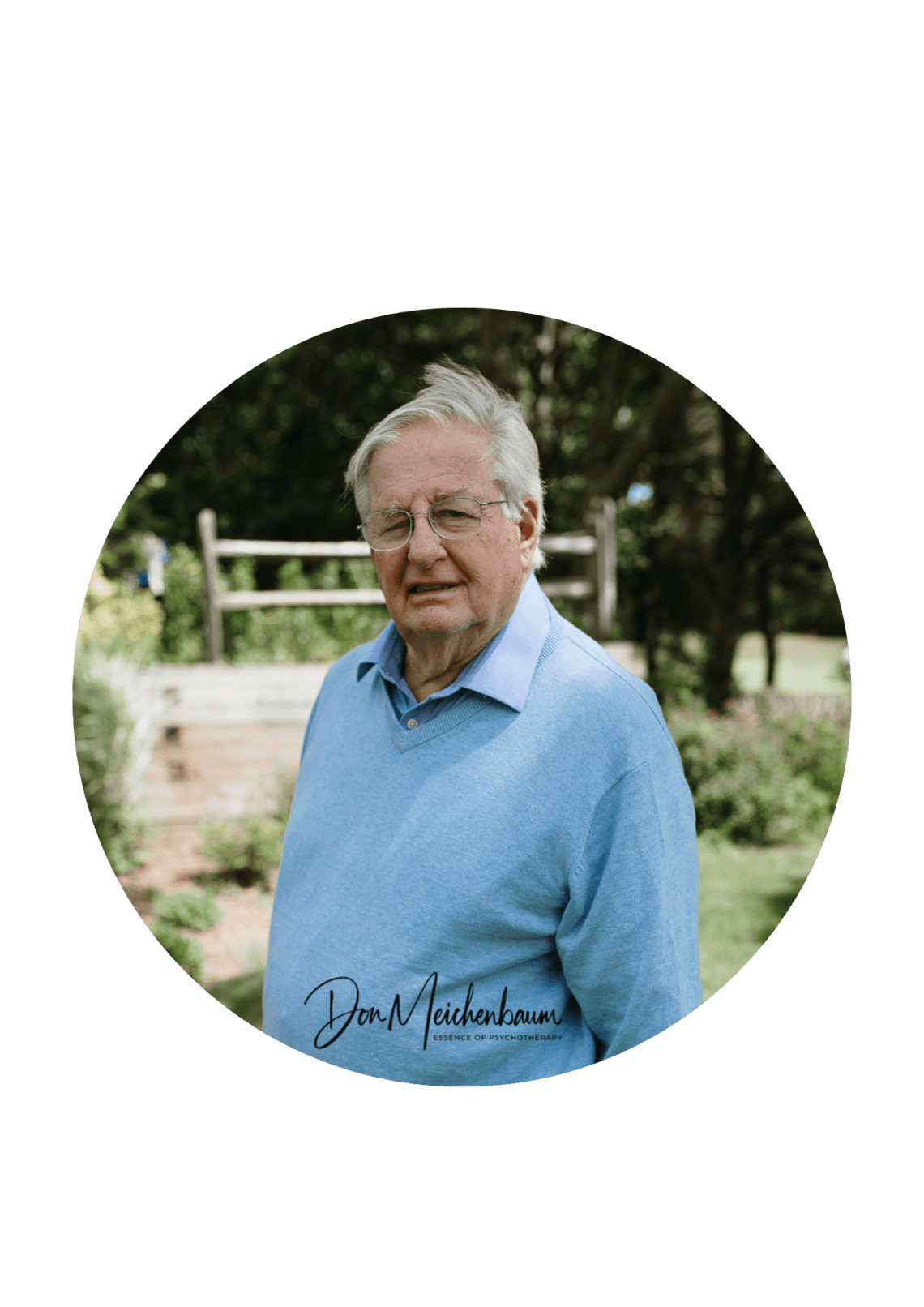
The programme is made up of three courses, as outlined below:
This course brings together 55 years of Dr Donald Meichenbaum's expertise in clinical research, practice, consultation and supervision. This psychotherapy course focuses on how to develop expertise, treating specific disorders and developing resilience across the life span.
Getting Better Results: Core Tasks and
Skills of Expert Psychotherapists
Course 1
In Essence of Psychotherapy
Treating Specific Disorders and the
Secret of Strengths- Based Narrative Approaches
Course 2
In Essence of Psychotherapy
Ordinary Magic:
Building Resilience
and Strengths Across
the Life Span
Course 3
In Essence of Psychotherapy
You do not need to do every unit and you also do not need to do units in a consecutive order.
COURSE 1
Getting Better Results: Core Tasks and Skills of Expert Psychotherapists
Course 1 In Essence of Psychotherapy
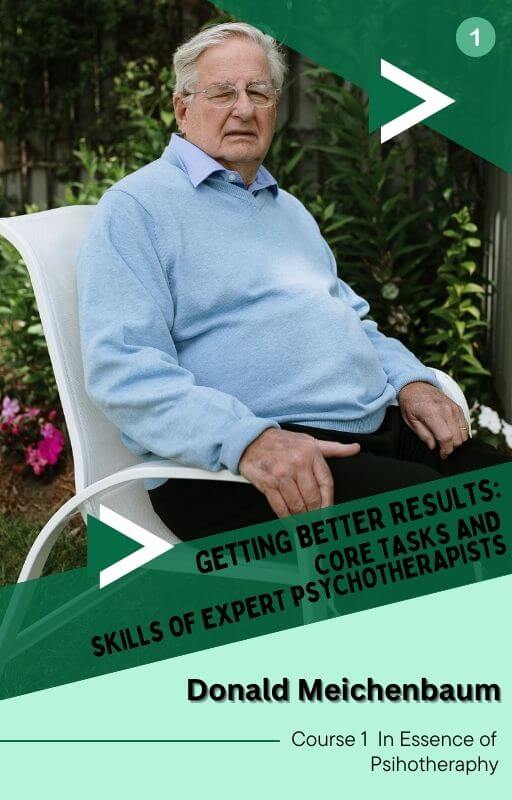
Dr Donald Meichenbaum PhD
”Therapists get paid to listen to their patient’s stories in a compassionate and trust-engendering manner.The first thing every therapist should do is establish a warm and non-judgmental Therapeutic Alliance and use empathy to help a client to tell their story. Establishing, maintaining, and monitoring the quality of the Therapeutic Alliance is the single greatest predictor of treatment outcomes, and from which therapists enable the client to tell the ‘rest of their story’.”
About Dr Donald Meichenbaum PhD
- Donald Meichenbaum, Ph.D is Distinguished Professor Emeritus from the University of Waterloo, Ontario, Canada from which he took early retirement 25 years ago. He is presently Research Director of the Melissa Institute for Violence Prevention in Miami, Florida (please visit www.melissainstitute.org). He is one of the founders of Cognitive Behavior Therapy and in a survey of clinicians reported in the American Psychologist, he was voted “one of the ten most influential psychotherapists of the 20th century.”
- He was the Honorary President of the Canadian Psychological Association and he has received a Lifetime Achievement Award from the Clinical Division of the American Psychological Association. His article with Scott Lilienfeld on How to Spot Hype in Psychotherapy: A 19 Item Checklist won was awarded “Best Contribution to the Field of Psychotherapy” by the Journal of Contemporary Psychotherapy.
(Available here: https://melissainstitute.org/wp-content/uploads/2018/02/Don.HOW-TO-SPOTacceptedversionnovember13.pdf)
- He has presented in all 50 U.S. States and internationally.
- He has published extensively and his latest books include Roadmap to Resilience (roadmaptoresilience.wordpress.com), Treatment of Individuals with Addictive Disorders, and Evolution of Cognitive Behaviour Therapy – in addition to his classics: Stress Inoculation Training and Cognitive Behavioural Modification: An Integrative Approach – and many more.
- Dr Meichenbaum is literally one of the founders who put the C in CBT nearly 40 years ago. His contributions to the field of coping with stress and resilience are legendary.
- Dr Meichenbaum's presentations are noted for the blending of critical scholarship, clinical practicality and humour. He is extremely generous in sharing his materials and knowledge.
- You can read more about Donald Meichenbaum here.
And he has incredible set of resources on the Melissa Institute website here: https://melissainstitute.org/scientific-articles-by-author/
-
- It begins this Diploma by discussing the nature of expertise and Core Tasks of psychotherapy.
-
- It is designed to help psychotherapists to understand the nature of expertise in psychotherapy and the Core Tasks of expert psychotherapists. This will enable them to implement these principles and to apply professional self-doubt and deliberate practice whilst eliciting feedback, to become part of the 25% of psychotherapists who get 50% of the positive outcomes with their patients and clients.
- The complete list of topics and Modules covered includes:
- The purpose is to increase the likelihood you will fall into the “expert" group of psychotherapists. This Module will begin to examine what it is that experts do and demonstrate, when compared to experienced and novice psychotherapists.
-
By the end you will be able to:
Module 1:
Tuesday 2nd July 2024 10am-12pm: Watch and Discuss
Friday 5th July 2024 4.30pm-6pm: Review
Module 2:
Tuesday 9th July 2024 10am-12pm: Watch and Discuss
Friday 12th July 2024 4.30pm-6pm: Review
Module 3:
Tuesday 16th July 2024 10am-12pm: Watch and Discuss
Friday 19th July 2024 4.30pm-6pm: Review
Module 4:
Tuesday 23rd July 2024 10am-12pm: Watch and Discuss
Friday 26th July 2024 4.30pm-6pm: Review
Module 5:
Tuesday 30th July 2024 10am-12pm: Watch and Discuss
Friday 2nd August 2024 4.30pm-6pm: Review
Module 6:
Tuesday 6th August 2024 10am-12pm: Watch and Discuss
Friday 9th August 2024 4.30pm-6pm: Review
Module 7:
Tuesday 13th August 2024 10am-12pm: Watch and Discuss
Friday 16th August 2024 4.30pm-6pm: Review
Module 8:
Tuesday 20th August 2024 10am-12pm: Watch and Discuss
Friday 23rd August 2024 4.30pm-6pm: Review
Module 9:
Tuesday 27th August 2024 10am-12pm: Watch and Discuss
Friday 30th August 2024 4.30pm-6pm: Review
Module 10:
Tuesday 3rd September 2024 10am-12pm: Watch and Discuss
Friday 6th September 2024 4.30pm-6pm: Review
- Dr Donald Meichenbaum PhD has recorded a series of videos for the UK College of Hypnosis & Hypnotherapy, outlining his knowledge and expertise. These recordings, along with comprehensive handouts, form the core materials and framework for the course.You will have access to all video recordings and handouts when you sign up to the Live Webcast course or the Self-led course.
- Live Webcast Course Fee: £495
- Live Webcast Course Includes:
- Access to all pre-recorded videos and lectures (lectures are available in the online learning platform. You will have access for 12 months from the start date of the course.)
- 10 modules and 10 comprehensive handouts
- Weekly facilitated sessions to watch the recorded lecture – join your facilitators and fellow students to watch each lecture and engage in a post lecture discussions and participate and practice the interventions and To Do tasks
- Weekly review session – join your fellow students to reflect, review and share your deliberate practise, experiences and challenges through peer support. The additional structure provided through these discussions and reviews is designed to help students stay accountable to their deliberate practice and development goals.
- All discussion and review sessions can be accessed for the duration of the course for revision and catch-up if a particular session cannot be attended live.
- Access to the dedicated discussion forum on Hypno-CBT connect for existing subscribers.
- Self-Led Diploma Fees: £175
- Self Led Diploma Includes:
- Access to all pre-recorded videos and lectures (12 months access from the start date of the course)
- 10 modules and 10 comprehensive handouts
- Watch all videos and read the handouts at your own pace.
COURSE 2
Treating Specific Disorders and the Power of Transdiagnostic Strengths-Based Narrative Approaches
Course 2 In Essence of Psychotherapy
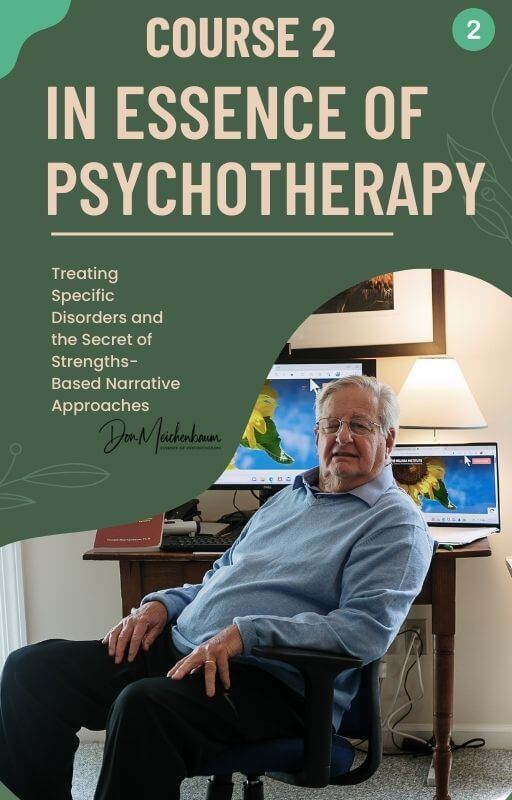
Dr Donald Meichenbaum PhD
“As psychotherapists we are privileged to listen to other people’s stories. We are all Homo Narrans or storytellers. In order to be an expert psychotherapist, you need to be an exquisite listener, compassionate and empathic. But listening alone is insufficient; Language structures reality and the questions we ask and the feedback we provide to clients and patients alters the stories they tell themselves and others as well as the beliefs that they hold. It is our job to bring out the good, not just the bad.”
About Dr Donald Meichenbaum PhD
- Donald Meichenbaum, Ph.D is Distinguished Professor Emeritus from the University of Waterloo, Ontario, Canada from which he took early retirement 25 years ago. He is presently Research Director of the Melissa Institute for Violence Prevention in Miami, Florida (please visit www.melissainstitute.org). He is one of the founders of Cognitive Behavior Therapy and in a survey of clinicians reported in the American Psychologist, he was voted “one of the ten most influential psychotherapists of the 20th century.”
- He was the Honorary President of the Canadian Psychological Association and he has received a Lifetime Achievement Award from the Clinical Division of the American Psychological Association. His article with Scott Lilienfeld on How to Spot Hype in Psychotherapy: A 19 Item Checklist won was awarded “Best Contribution to the Field of Psychotherapy” by the Journal of Contemporary Psychotherapy.
(Available here: https://melissainstitute.org/wp-content/uploads/2018/02/Don.HOW-TO-SPOTacceptedversionnovember13.pdf)
- He has presented in all 50 U.S. States and internationally.
- He has published extensively and his latest books include Roadmap to Resilience (roadmaptoresilience.wordpress.com), Treatment of Individuals with Addictive Disorders, and Evolution of Cognitive Behaviour Therapy – in addition to his classics: Stress Inoculation Training and Cognitive Behavioural Modification: An Integrative Approach – and many more.
- Dr Meichenbaum is literally one of the founders who put the C in CBT nearly 40 years ago. His contributions to the field of coping with stress and resilience are legendary.
- Dr Meichenbaum's presentations are noted for the blending of critical scholarship, clinical practicality and humour. He is extremely generous in sharing his materials and knowledge.
- You can read more about Donald Meichenbaum here.
And he has incredible set of resources on the Melissa Institute website here: https://melissainstitute.org/scientific-articles-by-author/
Learning Overview:
It is designed to help psychotherapists to understand the nature of specific disorders, and to apply evidence-based interventions for those disorders using a person-centered and strengths-based, Constructive Narrative approach. It draws on, and continues to emphasize, the principles, skills and Core Tasks of psychotherapy that were introduced in Course 1 (although these courses do not need to be taken in that order). It will therefore focus on engendering strengths and signs of resilience, collaboration, and establishing, monitoring and maintaining the Therapeutic Alliance as key factors in successful treatment outcomes throughout this course.
- The complete list of topics and Modules covered includes:
- Module 11: How to develop chronic PTSD and co-occuring disorders; Treatment implications
- Module 12: Treatment of individuals with anxiety and depression
- Module 13: Treatment of individuals with PTSD
- Module 14: Treatment of individuals with prolonged and complicated grief and traumatic bereavement
- Module 15: Treatment of individuals with substance abuse disorders
- Module 16: Treatment of suicidal patients
- Module 17: Treating patients with co-occuring disorders
- Module 18: Treating patients with anger-control problems and aggressive behaviours
- Module 19: Integration of spirituality and psychotherapy in clinical practice
- Module 20: Putting it all together: Assessing your level of "expertise"
Module 11
Tuesday 8th October 2024 10am-12pm: Watch and Discuss
Tuesday 15th October 2024 10am-12pm: Review
Module 12
Tuesday 22nd October 2024 10am-12pm: Watch and Discuss
Tuesday 29th October 2024 10am-12pm: Review
Module 13
Tuesday 5th November 2024 10am-12pm: Watch and Discuss
Tuesday 12th November 2024 10am-12pm: Review
Module 14
Tuesday 19th November 2024 10am-12pm: Watch and Discuss
Tuesday 26th November 2024 10am-12pm: Review
Module 15
Tuesday 3rd December 2024 10am-12pm: Watch and Discuss
Tuesday 10th December 2024 10am-12pm: Review
Module 16
Tuesday 14th January 2025 10am-12pm: Watch and Discuss
Tuesday 21st January 2025 10am-12pm: Review
Module 17
Tuesday 28th January 2025 10am-12pm: Watch and Discuss
Tuesday 4th February 2025 10am-12pmm: Review
Module 18
Tuesday 11st February 2025 10am-12pm: Watch and Discuss
Tuesday 18th February 2025 10am-12pmm: Review
Module 19
Tuesday 25th February 2025 10am-12pm: Watch and Discuss
Tuesday 4th March 2025 10am-12pmm: Review
Module 20
Tuesday 11th March 2025 10am-12pm: Watch and Discuss
Tuesday 18th March 2025 10am-12pm: Review
- Dr Donald Meichenbaum PhD has recorded a series of videos for the UK College of Hypnosis & Hypnotherapy, outlining his knowledge and expertise. These recordings, along with comprehensive handouts, form the core materials and framework for the course. You will have access to all video recordings and handouts when you sign up to the Live Webcast course or the Self-led course.
- Live Webcast Course Fee: £495
- Live Webcast Course includes:
- Access to all pre-recorded videos and lectures (lectures are available in the online learning platform. You will have access for 12 months from the start date of the course.)
- 10 modules and 10 comprehensive handouts
- Weekly facilitated sessions to watch the recorded lecture – join your facilitators and fellow students to watch each lecture and engage in a post lecture discussions and participate and practice the interventions and To Do tasks.
- Weekly review session – join your fellow students to reflect, review and share your deliberate practise, experiences and challenges through peer support. The additional structure provided through these discussions and reviews is designed to help students stay accountable to their deliberate practice and development goals.
- All discussion and review sessions can be accessed for the duration of the course for revision and catch-up if a particular session cannot be attended live.
- Access to the dedicated discussion forum on Hypno-CBT connect for existing subscribers.
- Self-Led Diploma Fees: £175
- Self-Led Diploma Includes:
COURSE 3
Ordinary Magic: Building Resilience and Strengths Across the Life Span
Course 3 In Essence of Psychotherapy
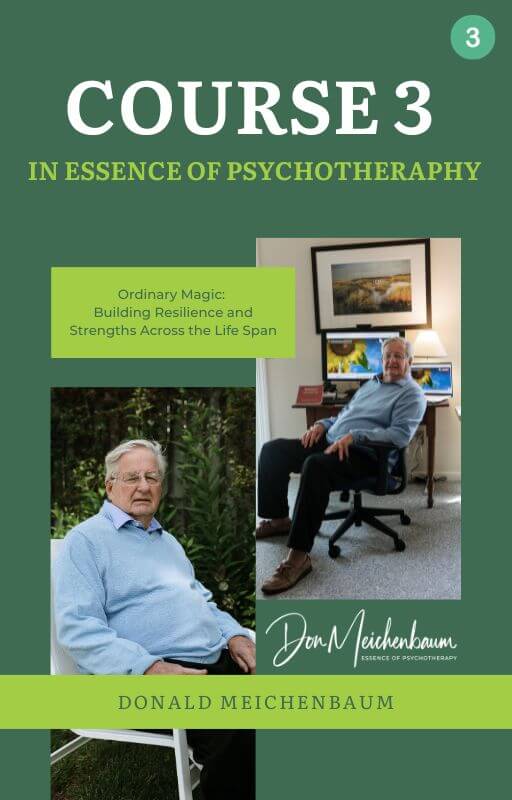
Dr Donald Meichenbaum PhD
"As we start the journey into Course 3 of this series, we are going to look at resilience across the entire lifespan. We'll start off with the nature of resilience itself, and my observation that while trauma is everywhere, so is resilience. And in fact, as you'll come to see, the good stuff is more critical than the bad stuff, in predicting how people will respond to difficult and challenging events. It's our task in these Modules to see how these kinds of foundational building blocks and resilience engendering behaviours that we will explore, can be applied across the entire lifespan, and across different populations and groups, including, importantly, for yourselves as psychotherapists."
About Dr Donald Meichenbaum PhD
- Donald Meichenbaum, Ph.D is Distinguished Professor Emeritus from the University of Waterloo, Ontario, Canada from which he took early retirement 25 years ago. He is presently Research Director of the Melissa Institute for Violence Prevention in Miami, Florida (please visit www.melissainstitute.org). He is one of the founders of Cognitive Behavior Therapy and in a survey of clinicians reported in the American Psychologist, he was voted “one of the ten most influential psychotherapists of the 20th century.”
- He was the Honorary President of the Canadian Psychological Association and he has received a Lifetime Achievement Award from the Clinical Division of the American Psychological Association. His article with Scott Lilienfeld on How to Spot Hype in Psychotherapy: A 19 Item Checklist won was awarded “Best Contribution to the Field of Psychotherapy” by the Journal of Contemporary Psychotherapy.
(Available here: https://melissainstitute.org/wp-content/uploads/2018/02/Don.HOW-TO-SPOTacceptedversionnovember13.pdf)
- He has presented in all 50 U.S. States and internationally.
- He has published extensively and his latest books include Roadmap to Resilience (roadmaptoresilience.wordpress.com), Treatment of Individuals with Addictive Disorders, and Evolution of Cognitive Behaviour Therapy – in addition to his classics: Stress Inoculation Training and Cognitive Behavioural Modification: An Integrative Approach – and many more.
- Dr Meichenbaum is literally one of the founders who put the C in CBT nearly 40 years ago. His contributions to the field of coping with stress and resilience are legendary.
- Dr Meichenbaum's presentations are noted for the blending of critical scholarship, clinical practicality and humour. He is extremely generous in sharing his materials and knowledge.
- You can read more about Donald Meichenbaum here.
And he has incredible set of resources on the Melissa Institute website here: https://melissainstitute.org/scientific-articles-by-author/
Learning Overview
- It is designed to help you continue on your journey towards expertise by focussing ways in which to bolster resilience across different groups and populations, or to put this another way, to assist others (and ourselves) in the ability to bounce back from adversities.
As we have discussed in the other courses, whilst trauma is everywhere, so is resilience, and the good news is that the ‘good stuff’ is more important than the ‘bad’ in predicting how our patients will respond.
-
The evidence suggests that most of us will be impacted by challenges, stress, anxiety, trauma and other difficulties over the course of our lifetimes, although ~25% of us will get stuck there. Our mission then is to help our patients become part of that 75% group who are able to go on and lead a full life despite those difficulties.
The complete list of topics and Modules covered includes:
Module 21
Tuesday 22nd April 2025 10am-12pm: Watch and Discuss
Friday 24th April 2025 4.30pm-6pm: Review
Module 22
Tuesday 29th April 2025 10am-12pm: Watch and Discuss
Friday 2nd May 2025 4.30pm-6pm: Review
Module 23
Tuesday 6th May 2025 10am-12pm: Watch and Discuss
Friday 9th May 2025 4.30pm-6pm: Review
Module 24
Tuesday 13th May 2025 10am-12pm: Watch and Discuss
Friday 16th May 2024 4.30pm-6pm: Review
Module 25
Tuesday 20th May 2025 10am-12pm: Watch and Discuss
Friday 23rd May 2025 4.30pm-6pm: Review
Module 26
Tuesday 27th May 2025 10am-12pm: Watch and Discuss
Friday 30th May 2025 4.30pm-6pm: Review
Module 27
Tuesday 3rd June 2025 10am-12pm: Watch and Discuss
Friday 6th June 2025 4.30pm-6pmm: Review
Module 28
Tuesday 10th June 2025 10am-12pm: Watch and Discuss
Friday 13th June 2025 4.30pm-6pmm: Review
Module 29
Tuesday 17th June 2025 10am-12pm: Watch and Discuss
Friday 20th June 2025 4.30pm-6pmm: Review
Module 30
Tuesday 24th June 2025 10am-12pm: Watch and Discuss
Friday 27th June 2025 4.30am-6pm: Review
- Dr Donald Meichenbaum PhD has recorded a series of videos for the UK College of Hypnosis & Hypnotherapy, outlining his knowledge and expertise. These recordings, along with comprehensive handouts, form the core materials and framework for the course.You will have access to all video recordings and handouts when you sign up to the Live Webcast course or the Self-led course.
- Live Webcast Course Fee: £495
- Live Webcast Course Includes:
- Access to all pre-recorded videos and lectures (lectures are available in the online learning platform. You will have access for 12 months from the start date of the course.)
- 10 modules and 10 comprehensive handouts
- Weekly facilitated sessions to watch the recorded lecture – join your facilitators and fellow students to watch each lecture and engage in a post lecture discussions and participate and practice the interventions and To Do tasks
- Weekly review session – join your fellow students to reflect, review and share your deliberate practise, experiences and challenges through peer support. The additional structure provided through these discussions and reviews is designed to help students stay accountable to their deliberate practice and development goals.
- All discussion and review sessions can be accessed for the duration of the course for revision and catch-up if a particular session cannot be attended live.
- Access to the dedicated discussion forum on Hypno-CBT connect for existing subscribers.

FREE Sample of Course Materials
Dr Meichenbaum's handouts for his lectures and seminars are legendary. Each is a condensed handbook, typically between 30 to 60 pages long, filled with tips, guidance, key points extensively and fully referenced. Complete the form below to get your sample:

What people have to say about Donald's courses

COURSE FACILITATORS
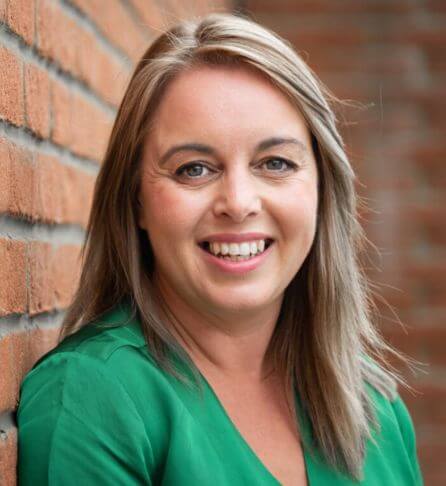
Theresa Brockway
Theresa is HCPC accredited Drama Psychotherapist and Cognitive Behavioural Hypnotherapist. Theresa offers Hypnotherapy, Creative Psychotherapy and Public Speaking Coaching to her clients and has a background in performance, touring theatre, Shakespeare and G&C.
Alongside her private practice, Theresa works as a Mental Health Specialist for the NHS and has facilitated group sessions, training and workshops for over 20 years in diverse settings.
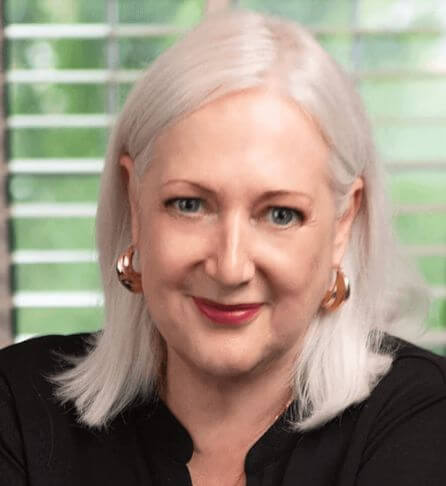
Slee Parish
Slee is a CBH therapist and a consultant nurse within the NHS. With the onset on Covid-19 her practice has changed to concentrate on frontline staff and the very particular anxieties, fear, and stressors they face during the pandemic. She is one half of the partnership that created www.nhsinmind.co.uk – a collection of free resources put together for frontline workers during Covid-19.
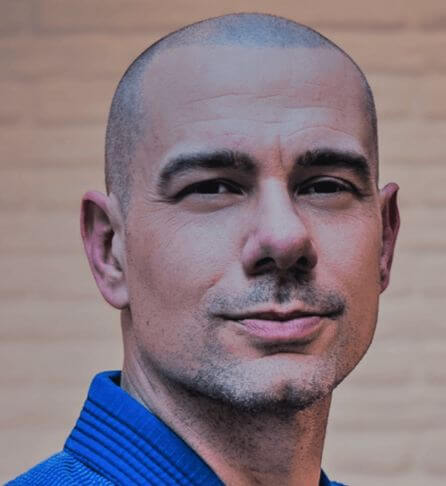
Chris People
Chris launched his practice in 2017 alongside a sister initiative, The Resilience Project Brighton, with the intention of improving access to evidence-based therapy and resilience coaching in Sussex and beyond. His main therapeutic interests are in addressing those mood and motivation sticking points that can sometimes prevent us from our most valued living.
Chris has a background in environmental science and martial arts.
Frequently asked questions
Is there an assessment for this course?
Yes – this will be a mix of practical to-do tasks and a written assignment (tbc).
What happens if I miss a day of the training?
In order to receive the certificate, you will need to show you have made up the face-to-face learning hours.
How long are the recorded lecture hours for the self-led course?
- Course 1 – 10 hours
- Course 2 – 10 hours
- Course 3 – 7.5 hours
Will I receive a certificate?
Yes – you will receive a certificate of completion and the overall certificate is to be confirmed.
Do I need to be a practicing therapist to attend?
No – we welcome all attendees however an understanding and interest in therapy will stand you in good stead for taking the course.
How many attended hours are in the live webcast course?
For the facilitated/live course – there are 3.5 hours of contact per week or 35 hours per Course. Each lecture is a slightly different length, but of each ‘Watch and Discuss’ sessions, roughly an hour is the lecture and the rest is discussion. This discussion element includes check ins, Q&A, deliberate practice, peer support and case discussion.




